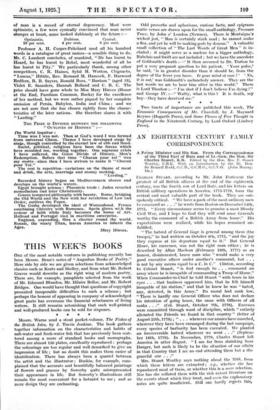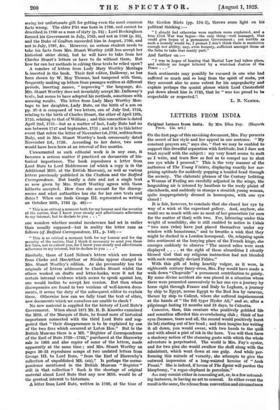AN EIGHTEENTH CENTURY FAMILY CORRESPONDENCE
A Prime Minister and His Son. From the Correspondence of the Third Earl of Bute and of Lt.-Gen. the Hon. Sir Charles Stuart, K.B. Edited by the Hon. Mrs. E. Stuart Wortley, C.B.E. With an Introduction by the Rt. Hon.
CHARLES STUART, according to Mr. John Fortcscue the greatest of all British officers at thc end of the eighteenth century, was the fourth son of Lord Bute, and his letters on British military operations in America, 1775-1779, form the central and most valuable part of the book. They are out- spokenly critical. "We have a pack of the most ordinary men to command us . . ." he wrote from Boston on December 14th, 1775. " Every circumstance seems to promise a most Bloody Civil War, and I hope to God they will send some Generals worthy the command of a British Army from home." His expectations were realized, while his hopes remained un- fulfilled.
"The hatred of General Gage is general among them (the troops)," he had written on October 8th, 1775, "and the joy they express at his departure equal to it." But General Howe, his successor, was not the right man either ; he is described by Allan Maclean (February 19th, 1777) as an honest, disinterested, brave man who "would make a very good executive officer under another's command, but . . . is not by any means equal to a C. in C." Clinton, according to Colonel Stuart, "is fool enough to . . . command an army where he is incapable of commanding a Troop of Horse." When Commander-in-Chief he told Stuart "with tears in his eyes . . . that business oppressed him, that he felt himself incapable of his station," and that he knew he was "hated, nay, detested, in this Army." Its moral had sunk low. "There is hardly one General Officer who does not declare his intention of going home, the same with Officers of all ranks . ." (Col. Stuart, October 7th, 1778). Excesses were committed through want of discipline, which "entirely alienated the Friends we found in that country" (letter of August 25th, 1779) ; " . . . wherever our armies have marched, wherever they have been encamped during the last campaign, every species of barbarity has been executed. We planted an irrecoverable hatred wherever we went . . ." (Septem- ber 16th, 1778). In November, 1779, Charles Stuart left America in utter disgust. "I am far from shrinking from Danger, but such is likely to be the situation of our affairs in that Country that I sec no end attending them but a dis- graceful one . ." Mrs. Stuart Wortley says nothing about the MSS. from which these letters are extracted ; e.g., whether she has reproduced most of them, or whether this is a mere selection. Nor has she collated them with the rich extant literature on the events about which they treat, and even the explanatory notes are quite insufficient. Still one hardly regrets this,
seeing her unfortunate gift for getting even the most conunon facts wrong. The elder Pitt was born in 1708, and cannot be
described in 1760 as a man of sixty (p. 24) ; .Lord Rockingham formed his Government in July, 1765, and not in 1766 (p. 53), and the Duke of Grafton succeeded him in August, 1766, and not in July, 1767, &c. However, no serious student needs to take his facts from Mrs. Stuart Wortley (still less accept her
historical atter dicta), but he will have to take from her
Charles Stuart's letters or have to do without them. But how far can her methods in editing these texts be relied upon? A number of letters from Lady Mary Wortley Montagu is .inserted in the book. Their first editor, Dallaway, as has been shown by W. Moy Thomas, had tampered with them, frequently making up letters from passages written at different periods, inserting names, " improving " the language, &c.
Mrs. Stuart Wortley does not invariably accept Mr. Dallaway's texts, but seems to have adopted his methods, sometimes with amusing results. The letter from Lady Mary Wortley Mon- tagu to her daughter, Lady Bute, on the birth of a son on pp. 37-8 is composed of two letters, one of July 2nd, 1753, relating to the birth of Charles Stuart, the other of April 15th, 1755, relating to that of William ; and this concoction is dated April 2nd, 1751—but as a matter of fact, Lady Bute had no son between 1747 and September, 1751; and it is to this latter event that refers the letter of November lst,1751,written.from Italy, and in Mrs. Stuart Wortley's book erroneously dated November 1st, 1750. According to her dates, two sons would have been born at an interval of five months.
_ Unwarranted as such editorial work is in any case, it becomes a serious matter if practised on documents of his- torical importance. The book reproduces a letter from Lord Bute to Lord Holdernesse (of which a copy is in the
Additional MSS. at the British Museum), as well as various letters previously published in the Chatham and the Bedford Correspondence. But hardly a date and not a single text as now given by Mrs. Stuart Wortley agrees with those
hitherto accepted. How does she account for the discrep- ancies and what authorities has she for her own texts and sates ? 'When one finds George III. represented as writing on October 26th, 1762 (p. 48) :—
" This is so critical ft, moment both for my honour and the security of the nation, that I know your steady and affectionate adherence to my interest, but to declare to you. .
one wonders whether mental incoherence had set in earlier than usually supposed—but in reality the letter runs as follows (cf. Bedford Correspondence, III., p. 140) :— " This is so critical a moment both for my honour and for the security of the nation, that I think it necessary to send you these few lines, not to exhort you, for I know your steady and affectionate adherence to my interest, but to declare to you. . . "
Similarly, those of Lord Nelson's letters which are known from Clarke and MacArthur or Nicolas appear changed in Mrs. Stuart Wortley's edition. As she presumably has the originals of letters addressed to Charles Stuart whilst the others worked on drafts and letter-books, were it not for certain internal evidence which seems to speak against her, one would incline to accept her version. But then where discrepancies are found in two versions of well-known docu- ments, it seems the duty of the subsequent editor to explain them. Otherwise how can we fully trust the text of other, new documents which we ourselves are unable to check ?
No new material is supplied for the history of Lord Bute's Government. When about 1871 Mr. R. B. Knowles examined the MSS. of the Marquis of Bute, he found none of historical importance connected with the third Lord Bute and sug- gested that "their disappearance is to be explained by one of the two fires which occurred at Luton Hoo." But in the British Museum there is a MS. "Register of Correspondence of the Earl of Bute 1739-1762," purchased at the Ilarrowby sale in 1903 and also copies of some of the letters, made apparently at the same time ; and Mrs. Stuart Wortley on pages 30-31 reproduces scraps of two undated letters from George III. to Lord Bute, "from the Earl of Harrowby's
collection of unpublished MS. (sic)." Is perhaps the corres- pondence mentioned in the British Museum " Register "
still in that collection ? Such is the shortage of original material about Lord Bute that any new MSS. would be of the greatest interest to historians.
A. letter from Lord But; written in 1780, at the time of
the Gordon Riots (pp. 194-5), throws some light on his political thinking :— " I should feel otherwise were matters more explained, and a true Civil War was begun—the only thing—well managed, that could give hopes of a permanent Government;. yet terrible as such a remedy would be, I protest I don't think there is resolution enough nor ability, nay, even honesty, sufficient amongst those at the helm to take that manly part."
And further on :—
"I was in hopes of hearing that Martial Law had taken place, and soldiers no longer fettered by a wretched Justice of the Peace . . "
Such sentiments may possibly be excused in one who had suffered so much and so long from the spirit of mobs, yet they account also to some extent for his unpopularity and explain perhaps the quaint phrase which Lord Chesterfield put down about him in 1763, that he "was too proud to be respectable or respected:: L. B. NAMIER.







































 Previous page
Previous page